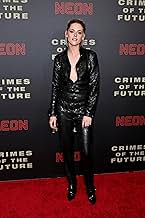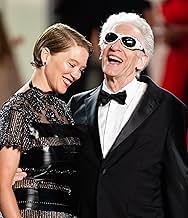Dans un futur proche, l'humanité apprend à s'adapter à son environnement synthétique. Cette évolution sort les hommes de leur état naturel et les mène vers une métamorphose, qui altère leur ... Tout lireDans un futur proche, l'humanité apprend à s'adapter à son environnement synthétique. Cette évolution sort les hommes de leur état naturel et les mène vers une métamorphose, qui altère leur apparence biologique.Dans un futur proche, l'humanité apprend à s'adapter à son environnement synthétique. Cette évolution sort les hommes de leur état naturel et les mène vers une métamorphose, qui altère leur apparence biologique.
- Réalisation
- Scénario
- Casting principal
- Récompenses
- 10 victoires et 33 nominations au total
Ephie Kantza
- Adrienne Berceau
- (as Efi Kantza)
Alexandra Anger
- Surgeon
- (non crédité)
Avis à la une
This flick is off the wall even for Cronenberg. And I'm amazed that such well known actors made this dark and almost plotless film.
It opens withan outrage and ends with a whimper. The dialogue is vague and depressing as is the premise that future art will be of pain and suffering.
It opens withan outrage and ends with a whimper. The dialogue is vague and depressing as is the premise that future art will be of pain and suffering.
Some people in the future muck about with their saucy organs and that's about it. Some of the effects and prosthetics are creative, but some of them are bobbins.
The drama is mundane. There's no suspense, tension or stakes. If all the movie had is a premise, then the body horror needed to be bonkers to give the audience a bit of fun. But it's all too serious. The philosophical aspect is brought to the fore, which is the least interesting thing about it. I like that it's trying something different, but it comes at the cost of good storytelling. A simple thriller element would have balanced the movie nicely. Unfortunately, the plot is too thin to hold any weight.
The sets and cinematography are good. The acting is clunky and the dialogue is waffling, when it's audible. Cronenberg has fallen victim to the trend of dialogue being whispered, mumbled, fried or delivered in an accent so outrageous that it's hard to decipher what anybody's banging on about.
A meandering, middle-of-the-road sci-fi.
The drama is mundane. There's no suspense, tension or stakes. If all the movie had is a premise, then the body horror needed to be bonkers to give the audience a bit of fun. But it's all too serious. The philosophical aspect is brought to the fore, which is the least interesting thing about it. I like that it's trying something different, but it comes at the cost of good storytelling. A simple thriller element would have balanced the movie nicely. Unfortunately, the plot is too thin to hold any weight.
The sets and cinematography are good. The acting is clunky and the dialogue is waffling, when it's audible. Cronenberg has fallen victim to the trend of dialogue being whispered, mumbled, fried or delivered in an accent so outrageous that it's hard to decipher what anybody's banging on about.
A meandering, middle-of-the-road sci-fi.
"crimes of the future" is an efficient film, it does a lot with little, without big sets and gigantic practical effects, everything is very simple but very convincing, the scenery compositions are dirty with a dark photograph, always looking for an intrinsic degradation, the effects practical are good, the few CGI are weak, but the sound editing is magnificent, always looking for sounds that seek the viewer's discomfort, another positive point is the performances, the duo Vigo mortise and Léa Seydoux are very good, Viggo manages to show all the pain and anguish of her character with her body and vocal posture, Kristen is another highlight, making an anxious and paranoid character the actress delivers a very good performance, despite her little screen time, but the best point here, I bring the classic and brilliant Canadian director, david cronenberg, is his script, which, despite being a little confusing, has as its main premise the limit of art, its contradictions and subversive appreciations, its criminal lity, and with that it makes a self-reflection of its own filmography, the film is also a critique of state bureaucracy and government intervention in art, all on a derogatory dystopian futuristic science fiction plan. The feature has some problems, the biggest one is perhaps the subtexts that are open and not always completed. We don't have the best version of Cronenberg here, but his style remains authorial and inviting. Grade 7/10.
This movie starts out great, with an awesomely dark opening scene to set the mood. It's really weird immediately and reaches high levels of grossness, but I surprisingly dug it. In many movies set in the future, it really isn't much different except for the technology and a few aesthetics. But here, we see a really interesting depiction of where humanity ends up, some of which I find scarily possible.
Unfortunately, it's extremely dull with just the slightest hint of a story and doesn't amount to anything. By the end I was checked out, or else I might've been furious at how it ends. I think many people will think this is one of the worst movies they've seen. (1 viewing, 6/8/2022)
Unfortunately, it's extremely dull with just the slightest hint of a story and doesn't amount to anything. By the end I was checked out, or else I might've been furious at how it ends. I think many people will think this is one of the worst movies they've seen. (1 viewing, 6/8/2022)
My thoughts on "Crimes" is more of a deep-dive into the metaphorical meanings within Cronenberg's on-the-nose, satirical (albeit horrific) and sometimes humorous view of modern-day technology (ex: eating chair, sleeping bed, autopsy bed), exhibitionism and voyeurism (ex: Saul, Caprice, Timlin, two women with drills), pop culture (ex: Klinik/Ear Man, others), celebrity status (Saul and Caprice), and ultimately the "plastic" society that we have become (ex: plastic eaters, non-plastic eaters, and those "evolving" into eating plastic. There are also the "policing agencies" (Cope, Wippet, Timlin) that tries to regulate and/or terminate humanities permanent decline into a meaningless existence of seeking out ever-greater, "shocking" sensualities (ex: government's attempts to regulate social media and the moral decline of society).
The story clearly identifies "plastic" as the synthetic, cheap, easily consumed and digested content in social media (I think of "Barbie Girl" by Aqua, Madonna's "Material Girl"). Each of the main characters is participating in the so-called "art" in some way with a brief glimpse of a "normal person" who dies from eating "plastic".
The boy Brecken, from the outset, has already "evolved" into a full plastic eater. The mother, representing parents of young "social media artists" today, smothers him. This represents the consequences of parents allowing their children to consume and produce cheap, easy to consume exhibitionism eventually leading them to be killed by it (ex: kids being killed by their stalkers, older men being fans of young girls) as if the parent was the actual murderer.
Through the entire story, the main character Saul resists "evolving" into a plastic eater (ex: "tumor-like organs" that grow inside him = the cancers of society) using alien-looking tech just to eat and sleep (Ex: cpap, hospital surgical devices, feeding tubes, mechanised beds etc). Finally, after just giving in to "evolving" into a plastic eater does he find complete contentment and peace. However, never does he realize that his "painless" exhibitionism is the very cause of his morphing into a plastic eater; he's now desensitised to it all.
Along the way, we also meet two woman voyeurists who drill holes into people's heads representing the mindless, intellegence draining people of YouTube Channels and pornography; they create content that displays to everyone their so-called "inner beauty" but is secretely "horrific" for us to watch, and we can't turn our eyes away (ex: Adrienne, Ear Man, zipper device, etc.). In addition, Ear Man (Klinik) demonstrates how even the hippocritical Producer of his "Art" (ex: the music and entertainment industry) can be the very one who exploits the financial successes but joins the "popular" view of hating it (ex: anonymous likes, dislikes, etc.).
There are many more metaphorical references throughout the story and Cronenberg uses the genre as a warning of the future "horrors" of becoming "Plastic Eaters". Cronenberg asks us If we are disgusted by what we are watching and thus why are we not disgusted by what we "consume" in today's media? He suggests that if we are not disgusted by what we're watching, we're already a plastic eater. Indeed, ultimately society will become senseless, meaningless, painless, completely devoid of the characteristics that make us human if we don't stop eating plastic both metaphorically (ex: social media, empty entertainment, exhibitionism, voyeurism, pop culture, celebrity status, etc.) and physically (ex: oceans being full of plastic-fish eat it, we eat the fish). Neither has any nutritional value.
The story clearly identifies "plastic" as the synthetic, cheap, easily consumed and digested content in social media (I think of "Barbie Girl" by Aqua, Madonna's "Material Girl"). Each of the main characters is participating in the so-called "art" in some way with a brief glimpse of a "normal person" who dies from eating "plastic".
The boy Brecken, from the outset, has already "evolved" into a full plastic eater. The mother, representing parents of young "social media artists" today, smothers him. This represents the consequences of parents allowing their children to consume and produce cheap, easy to consume exhibitionism eventually leading them to be killed by it (ex: kids being killed by their stalkers, older men being fans of young girls) as if the parent was the actual murderer.
Through the entire story, the main character Saul resists "evolving" into a plastic eater (ex: "tumor-like organs" that grow inside him = the cancers of society) using alien-looking tech just to eat and sleep (Ex: cpap, hospital surgical devices, feeding tubes, mechanised beds etc). Finally, after just giving in to "evolving" into a plastic eater does he find complete contentment and peace. However, never does he realize that his "painless" exhibitionism is the very cause of his morphing into a plastic eater; he's now desensitised to it all.
Along the way, we also meet two woman voyeurists who drill holes into people's heads representing the mindless, intellegence draining people of YouTube Channels and pornography; they create content that displays to everyone their so-called "inner beauty" but is secretely "horrific" for us to watch, and we can't turn our eyes away (ex: Adrienne, Ear Man, zipper device, etc.). In addition, Ear Man (Klinik) demonstrates how even the hippocritical Producer of his "Art" (ex: the music and entertainment industry) can be the very one who exploits the financial successes but joins the "popular" view of hating it (ex: anonymous likes, dislikes, etc.).
There are many more metaphorical references throughout the story and Cronenberg uses the genre as a warning of the future "horrors" of becoming "Plastic Eaters". Cronenberg asks us If we are disgusted by what we are watching and thus why are we not disgusted by what we "consume" in today's media? He suggests that if we are not disgusted by what we're watching, we're already a plastic eater. Indeed, ultimately society will become senseless, meaningless, painless, completely devoid of the characteristics that make us human if we don't stop eating plastic both metaphorically (ex: social media, empty entertainment, exhibitionism, voyeurism, pop culture, celebrity status, etc.) and physically (ex: oceans being full of plastic-fish eat it, we eat the fish). Neither has any nutritional value.
Le saviez-vous
- AnecdotesDavid Cronenberg's first film in thirty-five years not to have his sister Denise Cronenberg serve as costume design. Denise passed away in summer 2020.
- GaffesAround the 44th minute, when Caprice and Saul use the bed for their own play, the cuts on her chest differ between the scene when she was alone and after he joined her on the bed.
Meilleurs choix
Connectez-vous pour évaluer et suivre la liste de favoris afin de recevoir des recommandations personnalisées
- How long is Crimes of the Future?Alimenté par Alexa
Détails
- Date de sortie
- Pays d’origine
- Site officiel
- Langue
- Aussi connu sous le nom de
- Crímenes del futuro
- Lieux de tournage
- Piraeus, Grèce(hotel Sparti exteriors: Kapodistriou 18)
- Sociétés de production
- Voir plus de crédits d'entreprise sur IMDbPro
Box-office
- Budget
- 35 000 000 $US (estimé)
- Montant brut aux États-Unis et au Canada
- 2 452 882 $US
- Week-end de sortie aux États-Unis et au Canada
- 1 117 962 $US
- 5 juin 2022
- Montant brut mondial
- 4 551 565 $US
- Durée
- 1h 47min(107 min)
- Couleur
- Mixage
- Rapport de forme
- 1.85 : 1
Contribuer à cette page
Suggérer une modification ou ajouter du contenu manquant










































